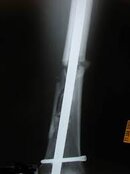It would seem to me that, as we gain experience and go through some minor glitches on dives, we should increase our capacity to tolerate issues underwater. I'm wondering what could cause an experienced (say, more than 200 lifetime dives) diver to become distressed enough to lose rational thought. Has anyone here (who meets those criteria) been through a panic event? What caused it, and what did you do?
You are using an out of date browser. It may not display this or other websites correctly.
You should upgrade or use an alternative browser.
You should upgrade or use an alternative browser.
Question Panic in the experienced diver?
- Thread starter TSandM
- Start date
Please register or login
Welcome to ScubaBoard, the world's largest scuba diving community. Registration is not required to read the forums, but we encourage you to join. Joining has its benefits and enables you to participate in the discussions.
Benefits of registering include
- Ability to post and comment on topics and discussions.
- A Free photo gallery to share your dive photos with the world.
- You can make this box go away
so where are the pictures, tough guy ;-)
oldschoolto
Contributor
oldschoolto
Contributor
descent
Contributor
... 2: ... I need you to find a bar so I'll be able to get my arm out from in between the belt and roller ...
Holy crap!
It seems to me that there are several levels of calm in the face of injury.
faints at discussion of blood
faints at the sight of fake blood
faints at the sight of real blood
wails and cries far in excess of need after a stubbed toe
turns away, cannot watch the doctor stitching up laceration for third party
turns away, cannot watch the phlebotomist insert the needle to draw blood
turns away, cannot watch the doctor stitching up laceration for a dear friend
turns away, cannot watch the doctor stitching up open wound on yourself
shuts down and enters shock quickly after simple accident trauma (concussed, non-penetrating fracture)
able to skip doctors and stitch shut personal lacerations without assistance or anesthetic
enters shock slowly and calmly after major accident trauma with tissue evulsion and blood loss
enters shock slowly and calmly as above, able to return fire with accuracy
enters shock slowly, calmly, shoots well, able to scream insulting non-English phrases using good regional accent
is curious about the sensations of major abdominal surgery, willing to try local anesthetic
This is guesswork. I may have these out of order. I'm sure the medical contributors can provide much better descriptions than mine.
Still, Jim, looks like you haven't found your kryptonite yet.
Pain tolerance is so individual as to baffling. Some people are literally hysterical at a partially torn off fingernail. I worked 2 ER shifts on a truly shattered ankle, and only x-rayed it because the nurses made me. I've seen a guy run over by a car, with two very broken legs, with sweat running down his forehead but his voice absolutely calm and even.
I don't even know if pain and fear are all that related. I suspect that people who are highly anxious probably don't tolerate pain well, in part because they're busy imagining how much worse it could get. But I'm not sure that a high pain tolerance also means you're phlegmatic about mental distress. On the other hand, it is known that some of the pain relieving ability of opioids is anxiolysis, so maybe the reason people HAVE a high pain tolerance is the ability to control the emotional distress component of the pain.
I don't even know if pain and fear are all that related. I suspect that people who are highly anxious probably don't tolerate pain well, in part because they're busy imagining how much worse it could get. But I'm not sure that a high pain tolerance also means you're phlegmatic about mental distress. On the other hand, it is known that some of the pain relieving ability of opioids is anxiolysis, so maybe the reason people HAVE a high pain tolerance is the ability to control the emotional distress component of the pain.
oldschoolto
Contributor
I have examples that have no pain / injuries.... It's just not letting emotions get in the way... Panic can be fear based or being overloaded with a problem and just shutting down or making poor decisions....
I can't explain it really.... The worst something gets the slower time moves for me... It's a calm and relaxed feeling... I just keep working the problem and never feel overcome with loss of control of a situation.... And I know I'm not alone with this gift....
Jim...
I can't explain it really.... The worst something gets the slower time moves for me... It's a calm and relaxed feeling... I just keep working the problem and never feel overcome with loss of control of a situation.... And I know I'm not alone with this gift....
Jim...
billt4sf
Contributor
Since the time when we began cold water diving a few years ago, we have had many dives that have been great, and a few where one or the other of us has panicked (under Lynn's definition) or where we didn't panic but bad things have happened -- all of these have been in cold water with the drysuits and the concurrent limited visibility. I documented some of these events on SB. In warm water, we have felt great.
We have had various courses: drysuit, AOW, and of course OW. I would have to say that our instruction has been spotty at best.
Our approach now is to give it "one last big effort" by taking Fundies - starting tomorrow. If we can't get really comfortable with drysuit diving after that, we'll probably stop cold water diving.
- Bill & Emily
We have had various courses: drysuit, AOW, and of course OW. I would have to say that our instruction has been spotty at best.
Our approach now is to give it "one last big effort" by taking Fundies - starting tomorrow. If we can't get really comfortable with drysuit diving after that, we'll probably stop cold water diving.
- Bill & Emily
scagrotto
Contributor
It's not wasted time or unproductive if you can finish before retreating.That is no time to waste time on frenetic and unproductive activity.
it is known that some of the pain relieving ability of opioids is anxiolysis, so maybe the reason people HAVE a high pain tolerance is the ability to control the emotional distress component of the pain.
Getting demerol after breaking my leg in a motorcycle accident was the day I understood how people become junkies. As I lay on a gurney waiting to get into the OR I realized that if the place caught fire I'd have been thoroughly content to just watch the pretty flames. I've since read that demerol isn't really a very good painkiller, but I can certainly believe that the euphoria makes it very easy to be unaware that you still hurt. I expect that being busy trying to solve a serious problem has a similar effect. Of course I'm only one data point, but I've got a fairly high pain tolerance, and usually tend to remain calm and pragmatic when things go south.
As for panic, I've never experienced real panic, but I may have been fairly close once. It was on one of my very early dives during an AOW course, while doing my first night dive in a popular Pennsylvania quarry. The plan was to hit a couple of the things that have been sunk as attractions, seeing one at about 70' then following a line to one at about 40', then another one a bit shallower before ascending a line and doing a surface swim to shore. All went according to plan until we left the 40' feature on the wrong line and found ourselves back at 70'. Don't remember why we didn't turn back, but as relatively new divers we followed the instructor. By the time we got to the ascent line at the 70' obstacle I was very low on air. I should have used it as a chance to practice air sharing with the instructor, who had perhaps 2000psi in an AL100, but I was very fixated on the unlimited air supply at the other end of the ascent line and not thinking as clearly as i should have been. I showed the instructor my SPG, pointed at my chest and gave an emphatic thumbs up, then went up the line as fast as my computer would let me. As it turned out it was a great learning experience, though I don't recommend it to others.
Not full-blown panic, but as close as I've ever come, and in an...MRI Machine!
Turns out my body-size was very close to the limit the machine could accomodate. Feeling fine on the table prior to insertion into "the tube," I poo-pooed the offer of a mild sedative, & was non-plussed by the obvious coziness of the chamber, as I had done alot of saturation diving in my time, and was quite at home in a steel tank.
So in I go. Immediately, my shoulders are curved upwards in the cramped confines. My nose is slightly bent against the roof of the tube, I can barely move, I can see intimate details of the roof's paint-job. I close my eyes. I know my breathing is elevated, and I begin to feel that I cannot expand my chest adequately to breathe. The first searing stabs of panic invade my thinking. I try to breathe slowly & deeply, in thru the nose, out thru the mouth, but feelings of suffocation persist.
Sooo...I willed my body to relax. Immediately, I felt less confined ( I was amazed at how incredibly tense I'd been! ). Next came a total fixation on my breathing - very slow in, but not excessively, and very slow out. I began to feel in control, and the panic, while still lurking, was pushed far down & away. Feeling even better now. Then...pleasant thoughts ( a sunny day, a dark cool forest, a clear-running, gentle stream, the sounds of birds & the babbling brook... ) and repeating to myself that I was calm, comfortable & serene. Then...the infernal racket of the scanning process jolted me out of my skivvies!
But, I stayed cool. Actually dozed a while, and after a :30 ride, I was back into the world of infinite space.
I would highly recommend a ride in a cramped MRI Machine as a means of experiencing & conquering panic!
Regards,
DSD
Turns out my body-size was very close to the limit the machine could accomodate. Feeling fine on the table prior to insertion into "the tube," I poo-pooed the offer of a mild sedative, & was non-plussed by the obvious coziness of the chamber, as I had done alot of saturation diving in my time, and was quite at home in a steel tank.
So in I go. Immediately, my shoulders are curved upwards in the cramped confines. My nose is slightly bent against the roof of the tube, I can barely move, I can see intimate details of the roof's paint-job. I close my eyes. I know my breathing is elevated, and I begin to feel that I cannot expand my chest adequately to breathe. The first searing stabs of panic invade my thinking. I try to breathe slowly & deeply, in thru the nose, out thru the mouth, but feelings of suffocation persist.
Sooo...I willed my body to relax. Immediately, I felt less confined ( I was amazed at how incredibly tense I'd been! ). Next came a total fixation on my breathing - very slow in, but not excessively, and very slow out. I began to feel in control, and the panic, while still lurking, was pushed far down & away. Feeling even better now. Then...pleasant thoughts ( a sunny day, a dark cool forest, a clear-running, gentle stream, the sounds of birds & the babbling brook... ) and repeating to myself that I was calm, comfortable & serene. Then...the infernal racket of the scanning process jolted me out of my skivvies!
But, I stayed cool. Actually dozed a while, and after a :30 ride, I was back into the world of infinite space.
I would highly recommend a ride in a cramped MRI Machine as a means of experiencing & conquering panic!
Regards,
DSD
Starting about 3 years ago, occasionally on a blue water descent, I have to fight the urge to hyperventilate. I never am thinking about it before it happens and I am not surprised when it does, but I can feel panic sneaking up behind me when this occurs. I control the panic obviously, but it is a stern reminder that anyone can feel it.
I guess it has happened maybe 5 times out of a 1000 dives.
By the time I reach a depth and level off, it goes away as quickly as it came on.
I don't know what is causing it. Maybe lack of sleep triggers it? Stress topside? Vertigo? Getting old? Asthma which I had a case of viral induced a while back?
I get severe anxiety on my first descent as well, but I am an OW diver and I only have 20 logged dives. It also goes away when I level off. I am obsessed with diving and I worry about "not being built for diving" because of the sensation. Glad to here that even experienced divers can sometimes feel this. I did have a "lost at 100ft" situation on my 5th dive, out in the middle of nowhere on an empty sea floor, and then narcosis set in a bit which was my first experience with it. That freaked me right the hell out, but I didn't thrash about or bolt or anything, I just got as neutral as I could to stop exerting myself and then thought about it and communicated to my buddy to call the dive because we were lost and I was narced and both of us were so green. This situation seemed to mark the beginning of the "descent anxiety" on subsequent dives and explains my aversion to currents and drift diving.
I noticed that the anxiety is more severe when diving in cold water or I am very seasick as I enter the water. I am still working on my bouyancy, and I don't own my own gear so I am always trying to get used to new rental gear on the descent which doesn't help. As such I am also not fond of being in a water column where no solid surface is in sight, since I feel it is difficult to remain stationary in the water column.
Last edited:
Similar threads
- Replies
- 16
- Views
- 2,754
- Replies
- 15
- Views
- 2,591
- Replies
- 19
- Views
- 2,485
Trip Report
CAYMAN BRAC BEACH RESORT/REEF DIVERS
- Replies
- 50
- Views
- 4,117






